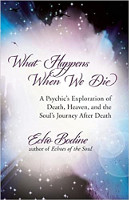
Image by Artemie Ixari
Death is often the elephant in the room that everyone pretends isn’t there. This must change, because what ends up happening is that the person who’s dying feels very alone in this important time of their life, unable to communicate to their loved ones about what they’re going through. We need to change that, for their sake and for ours.
We need to encourage the dying person to talk about what this feels like for them. It may seem awkward at first to get the conversation going, but once they know people are interested in what they’re going through, they usually have a lot to say. Their life is coming to an end, and at this time, many people take an inventory of their life. They have memories they want to share, resentments they may be holding on to, happy stories, sad stories, boring stories, exciting stories. They may want to share it all, and they need — and deserve — someone to listen to them.
Attitudes Towards Death
In my practice as a healer, I work with many clients who know they’re dying. Some of them deal with it straight-on by openly sharing their thoughts, feelings, hopes, and dreams, getting their affairs in order, tying up loose ends, and so on. Instead of pretending it’s not happening, they embrace this passage of their life. They cherish each day that they have and live it to the fullest. Sure, some clients come for healings hoping to be healed, but others come not to live longer but to feel better and have more energy while they’re here.
Unfortunately, most of us don’t have this kind of attitude when we find out we’re dying. The majority of dying clients I work with are frightened, depressed, and anxious about what’s ahead. They go through their dying process in a daze. They don’t want to talk about their feelings of anger, fear, or sadness and try to avoid feeling anything. When I asked him to tell me about his life, one male client said there wasn’t anything to talk about, but once I asked specific questions — about his childhood, his teen years, his time in the military, how he met his wife, what it was like to become a father, what he did before retirement — he had a whole bucket’s worth of stories to tell me. It was fun to watch him get so animated about his life. I could see sadness in him at times but pure joy at other times.
Getting Rid of Emotional Baggage
Another reason I think it’s so important to let the dying talk is that they can release old resentments and hurts that they’ve held on to for years. Many people believe that once we get to heaven all will be forgiven and we will be happy all the time, but that’s just not reality. Unfortunately, we bring emotional baggage with us when we go back home.
Many years ago, I was the labor coach for a friend of mine, and we were in the delivery room. Over in the corner of the room I saw the soul that was going to live in her baby’s body, and he was standing with two spirit helpers and nine suitcases. I silently asked him what the suitcases were for, and he said that they were issues he was bringing into this lifetime to heal. That’s why I think it’s especially important to clean up as much of our baggage from our current life as possible before we leave.
How To Talk and Listen To The Dying
Recently in my advanced psychic development class, one of my students told me that her cousin was dying of inoperable cancer, and she wondered what she could say to him to get him talking about how he was really doing. My answer was simple: “Ask him what this feels like for him. How is he doing emotionally and mentally? Show that you want — and can handle — an honest answer to your question, by being calm and present.”
If the dying person opens up and it seems like they want to talk but aren’t sure what to talk about, you can ask them questions like these:
-
What are your most memorable times?
-
If you could do things over, would you change anything?
-
What are you most proud of?
-
Do you have any regrets?
Ask if they are holding on to resentments, anger, or hatred and speak gently to them about forgiving the persons who hurt them. Do they feel as if they have unfinished business with anyone? Offer to deliver a note to someone if they want to write one. After each story they tell you, ask them what they got out of the experience. What did they learn? Reflecting on and answering this question can be very healing for them. It’s better to end the conversations on this kind of positive note.
The Gift of Loving-Kindness and Non-Judgment
Remember to ask these questions and listen without judgments. This is their story, not yours. They have their own opinions and beliefs about their life experiences, so listen and be willing to learn more about them.
By taking the time to listen sincerely to the stories of a dying person, you are giving them a great gift. Hopefully, when it’s your turn to go, others will show you that same loving-kindness.
Please remember that the dying person is in an intense process of wrapping things up from this lifetime. The more they can release their emotional pain, the easier their transition will be. If they can let go of bitterness and regret and arrive home with a clean slate, they will live a more beautiful existence on the other side.
*Additional subtitles by InnerSelf
©2013 by Echo Bodine. All Rights Reserved.
Reprinted with permission of the publisher,
New World Library. newworldlibrary.com.
Article Source:
What Happens When We Die: A Psychic's Exploration of Death, Heaven, and the Soul's Journey After Death
by Echo Bodine
 With her signature wit and fearlessness, psychic and healer Echo Bodine offers answers to life’s biggest questions: Is there a heaven? Are there people who have been there and come back? Do we have souls? Can we communicate with deceased loved ones? Based on Echo’s personal experience of observing the souls of people nearing death and communicating with souls who have died, this comforting book shines light on the dying process and the afterlife. Echo offers practical tools for being with dying loved ones, for grieving, and for cultivating clear communication with the deceased. Learning what happens when we die can be inspiring, reassuring, and profoundly life changing.
With her signature wit and fearlessness, psychic and healer Echo Bodine offers answers to life’s biggest questions: Is there a heaven? Are there people who have been there and come back? Do we have souls? Can we communicate with deceased loved ones? Based on Echo’s personal experience of observing the souls of people nearing death and communicating with souls who have died, this comforting book shines light on the dying process and the afterlife. Echo offers practical tools for being with dying loved ones, for grieving, and for cultivating clear communication with the deceased. Learning what happens when we die can be inspiring, reassuring, and profoundly life changing.
About the Author
 Echo Bodine discovered at age 17 that she has psychic abilities and the gift of healing. Her abilities include clairvoyance, the gift of seeing; clairaudience, the gift of hearing; and clairsentience, the gift of sensing. Echo studied psychic development for several years and learned about the gift of healing from her spirit guides and through prayer and meditation. In 1979, she quit her mainstream job and became a full-time psychic consultant, a healer, and a teacher of psychic development and healing classes, as well as a ghostbuster.
Echo Bodine discovered at age 17 that she has psychic abilities and the gift of healing. Her abilities include clairvoyance, the gift of seeing; clairaudience, the gift of hearing; and clairsentience, the gift of sensing. Echo studied psychic development for several years and learned about the gift of healing from her spirit guides and through prayer and meditation. In 1979, she quit her mainstream job and became a full-time psychic consultant, a healer, and a teacher of psychic development and healing classes, as well as a ghostbuster.
She is the author of several books, including Hands That Heal, The Gift, A Still, Small Voice, and Echoes of the Soul. She lectures throughout the country on intuition, spiritual healing, life, death, and life after death. She also offers workshops through The Center, her teaching and healing center in Minneapolis, Minnesota.
Her website is www.echobodine.com.


























